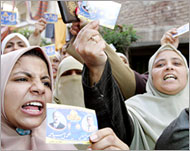Muslim Brotherhood flexes muscles
A senior figure in Egypt’s Muslim Brotherhood organisation has argued against non-Muslims holding leadership positions in Egypt, including the presidency.

Mohamed Habib, the first deputy of the Brotherhood’s Supreme Guide, said that “if we are to apply the Islamic rule which says that non-Muslims have no guardianship over Muslims, then a Christian may not be president”.
Habib was talking to reporters at the group’s headquarters in Manial al-Roda on Monday.
In a speech outlining the banned but tolerated group’s preliminary agenda for the next parliament, Habib said that the rule is the “only exception” regarding restrictions for non-Muslims.
Otherwise, they share the same “rights and duties of Muslims”.
Disputed
But according to Tarek El-Bishri, a respected Islamist intellectual and former judge, the Brotherhood’s interpretation of non-Muslim guardianship is meaningless in the modern age.
Constitutions and laws – rather than one individual as was the case in medieval times – govern guardianship today “and thus it doesn’t matter if the president is Muslim or Christian”, el-Bishri told Aljazeera.net
 |
|
The Muslim Brotherhood is |
The Coptic Christian community comprises approximately 10% of Egypt’s population of 72 million.
The Brotherhood’s gains in the ongoing three-stage parliamentary elections – 76 seats – have alarmed Coptic and secular groups in Egypt despite repeated attempts by the group’s leaders to allay their fears.
Habib’s latest statements are expected to trigger another wave of criticism against the group which aims at creating an Islamic state.
The Brotherhood announced that it will be pressing for political reforms such as lifting the emergency law, demanding general freedoms and the freedom to form political parties.
Agenda
The group will also call for the amendment of articles 76 and 77 of the constitution, relating to the president’s election and limiting the presidential term.
Last May, article 76 of the constitution was amended to allow for multi-candidate presidential elections in response to an initiative by Hosni Mubarak, the president, in February.
The new law, critics say, was tailor made to serve the ruling National Democratic Party and Mubarak.
Habib said: “We want every Egyptian to have the right to run for president and not just a candidate from the NDP.”